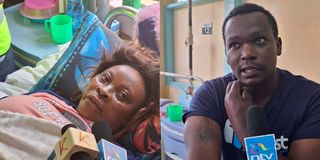How normal day turned tragic for two road accident survivors

Janet Nyambura and Joseph Kaiguri during an interview at Nakuru Teaching and Referral hospital on November 17, 2024.
On November 17, balloons were released in honour of the souls of lives lost and taken too soon in tragic accidents this year to commemorate the World Day of Remembrance for Road Traffic Victims.
In Nakuru alone nearly 300 lives have been lost this year, contributing to a national toll of over 4,400 people.
For the accident victims, it was a normal day until it wasn’t.
“In September I left home in the company of other friends for Bungoma for a function. We were traveling through Molo when suddenly, there was a loud bang," recounts Janet Nyambura, who lies in her bed at the Nakuru Teaching and Referral Hospital.
The accident occurred when their driver attempted to overtake another vehicle but, realizing he couldn’t manage, decided to pull back. In that moment of backing up in his lane, their vehicle collided with a lorry that was also trying to overtake them from behind.
“I was rushed to Molo sub-county Hospital, along with the others. Since I was seated at the front, the impact was more intense for us than for those seated at the back. Due to the severity of my injuries, I was transferred to PGH,” says Janet, a mother of one and grandmother of two.
Janet suffered multiple injuries, including fractures to her right leg, which broke in two places, as well as damage to her pelvic area and immobility in her left leg. Her teeth were also loosened from the impact.
“My life has changed completely in ways I never anticipated. I have a family that depends on me, and it will take time to recover. It’s been hard, even with the support from my family and neighbours, but I remain hopeful that I will get back on my feet soon,” Nyambura says with hope.
Nyambura was among the 15 accident victims who received assistive devices from the National Transport and Safety Authority (NTSA).
Another survivor, Joseph Kaiguri sits on his bed scrolling on his phone, one foot propped on the bed while the other foot rests on the floor with metal pins and screws running from just below his knee to his ankle.
“In February 2023, I was on my way to an interview in Nyeri and was riding my motorcycle, with my cousin as my passenger. As we were climbing a lane, an oncoming lorry had its headlights fully on, blinding me and causing me to lose control. I veered off the road, crashed into a ditch, and hit an electric pole,” says the 26-year-old.
Despite admitting that he wasn’t in the best mental state following a recent loss in the family, which had left him emotionally drained and distracted, Joseph maintains that the driver of the oncoming lorry was inconsiderate.
Kaiguri who had reduced his public appearances due to the discomfort caused by the metal brace on his leg, has been unable to return to work as he is still recovering from his injuries.
For the past year, the electrician has been in and out of the hospital, nursing severe injuries. His right arm now scarred is healed, but his left foot is still held together with a metal brace designed to align his broken bones. His cousin, who was riding with him, only suffered minor scratches to his face.
“After the accident, I spent seven months in hospital till I was discharged. Since then, I’ve been in and out for check-ups to see my progress. I just recently got admitted for my final run. I will undergo minor surgery to remove the metal brace from the leg and now get to recover until I’m back on my feet fully,” says Kaiguru happily.
As the festive season approaches, Kaiguri, like many others, emphasizes the importance of road safety.
“The government needs to mark roads in critical areas including corners, erect proper road signs, and road users to pay attention to speed limits. It’s also crucial to stay sober while driving and to avoid any form of substance abuse,” he warns.
Michael Kamau, the County Roads and Transport executive, has announced that the county government has allocated funds to enhance road safety.
As part of these efforts, 100 boda boda riders have been trained in safe driving practices and first aid response, and they have been issued licenses.
Additionally, 20 individuals in the Ngata area have been trained as first responders to assist with handling accident victims before the arrival of ambulances.
To further improve safety, traffic marshals have been deployed at key locations, especially near schools, to help children cross the roads safely.
